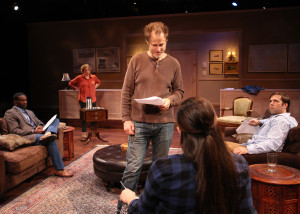‘Seminar’ deftly reveals the private world of the writer
By Eric Marchese
 Writing, especially in literature, is an especially personal art and craft, and the path to a career in that field can be fraught with difficulties, setbacks and self-doubt – a lonely world where the brickbats are as humiliatingly public as the bouquets.
Writing, especially in literature, is an especially personal art and craft, and the path to a career in that field can be fraught with difficulties, setbacks and self-doubt – a lonely world where the brickbats are as humiliatingly public as the bouquets.
“Seminar” shows us that world in microcosm through four would-be novelists whose potential has earned them a spot in the 10-week private course taught by a once-famed writer.
Chance Theater’s Orange County premiere of Theresa Rebeck’s 2011 play shows the foursome’s constantly evolving relationships, alliances and rivalries, driven by the often incendiary statements of their egocentric instructor Leonard, a once-celebrated novelist.
This fascinating world could have been played either strictly for conflict-generated laughs or as a dark parable. Neither approach, though, works as well as the realism devised by director Elina De Santos and her exemplary cast.
Rebeck’s text gives her five characters sufficient back-story that anyone cast in “Seminar” can peel layers back gradually, so that an instructor who seems like a misogynistic, self-centered jerk, and a writer who seems more prone to observe than participate, have tenable reasons for their conduct.
“Seminar” depicts the creative process by showing first people purportedly devoted to the written word and its power to enthrall, move or sway countless readers, and second, their interaction as they debate the issues of what makes good writing.
That discourse puts some of the course’s students on the defensive – and that sharpens the play’s double-edged comedic-dramatic sword.
For all its intelligence, Rebeck’s script is facile. Its scathing humor derives from its harshly accurate depiction of the baser aspects of human nature versus the noble traits we may think we possess, yet rarely do.
Hosting the course is Bennington-educated Kate (Karen Jean Olds) in the spacious, nine-room Upper West Side apartment owned by her family (convincingly rendered by Bruce Goodrich’s scenic design).
Most successful of the four is garrulous preppie Douglas (Christian Telesmar), a pretentious intellectual whose vernacular sounds like the recitation of a textbook. Youngest is the attractive Izzy (Asialani Holman), a calculating opportunist who exploits her sex appeal.
The newest member is Kate’s high school classmate Martin (Casey Long). Outwardly earnest and sincere, he takes advantage of Kate’s feelings for him, lusts after Izzy, and shows jealousy-tinged contempt toward Douglas’ success as a published author.
The first of the four to have her work evaluated, Kate isn’t shy about challenging the assertions or deflecting the barbs flung at her by instructor Leonard (Ned Liebl).
Leonard is so fogbound and absent-minded, he can’t remember basics like his students’ names, whose manuscripts he has read or what he has said about them. Among the character’s laugh-generating traits are his blunt manner, profanity, and a beyond self-centered ego through which his every conversation comes back to his favorite subject: himself.
A mentor figure who brooks no opposition to his pronouncements, Leonard cunningly measures the effect his words have on his students. He’s also a preening globetrotter who celebrates his own visits to hotspots like Somalia and Rwanda, insisting his apprentices do the same to sharpen their insight and thicken their skin to criticism.
Impoverished and struggling, Martin lives more inside his head than in the rough-and-tumble of the real world, holding back on letting anyone see his work for fear of criticism and ridicule. “Seminar” draws to a close as a showdown between this reluctant would-be novelist and a now-bitter would-be guru in what might be a passing of the torch.
De Santos adroitly captures the script’s acerbic tone, and her use of Mozart piano pieces to bridge scenes reflects the delicate web woven by Rebeck’s words and Chance Theater’s first-rate cast.
Liebl projects a scruffy, self-absorbed eccentric genuinely shocked by the squalor of Third-World nations and decrying their lack of empathy yet showing only disdain for his students. How Liebl reveals the more complex aspects of his character’s nature makes for an enjoyably revelatory performance.
Long’s deceptively uncomplicated portrayal spotlights Martin’s self-protective caution, priggish manner, downcast exterior and intense reverence for the written word. Olds’ adeptly comical gestures and timing add extra bite to Kate’s sardonic remarks, while Holman and Telesmar breathe life, and thus credibility, into the drastically underwritten roles of Izzy and Douglas.
In all, Chance’s engaging production brings Rebeck’s observations to light in ways likely to humanize for audiences those seemingly aloof, eccentric, hard-to-fathom creatures known as writers.
Leave a Reply
